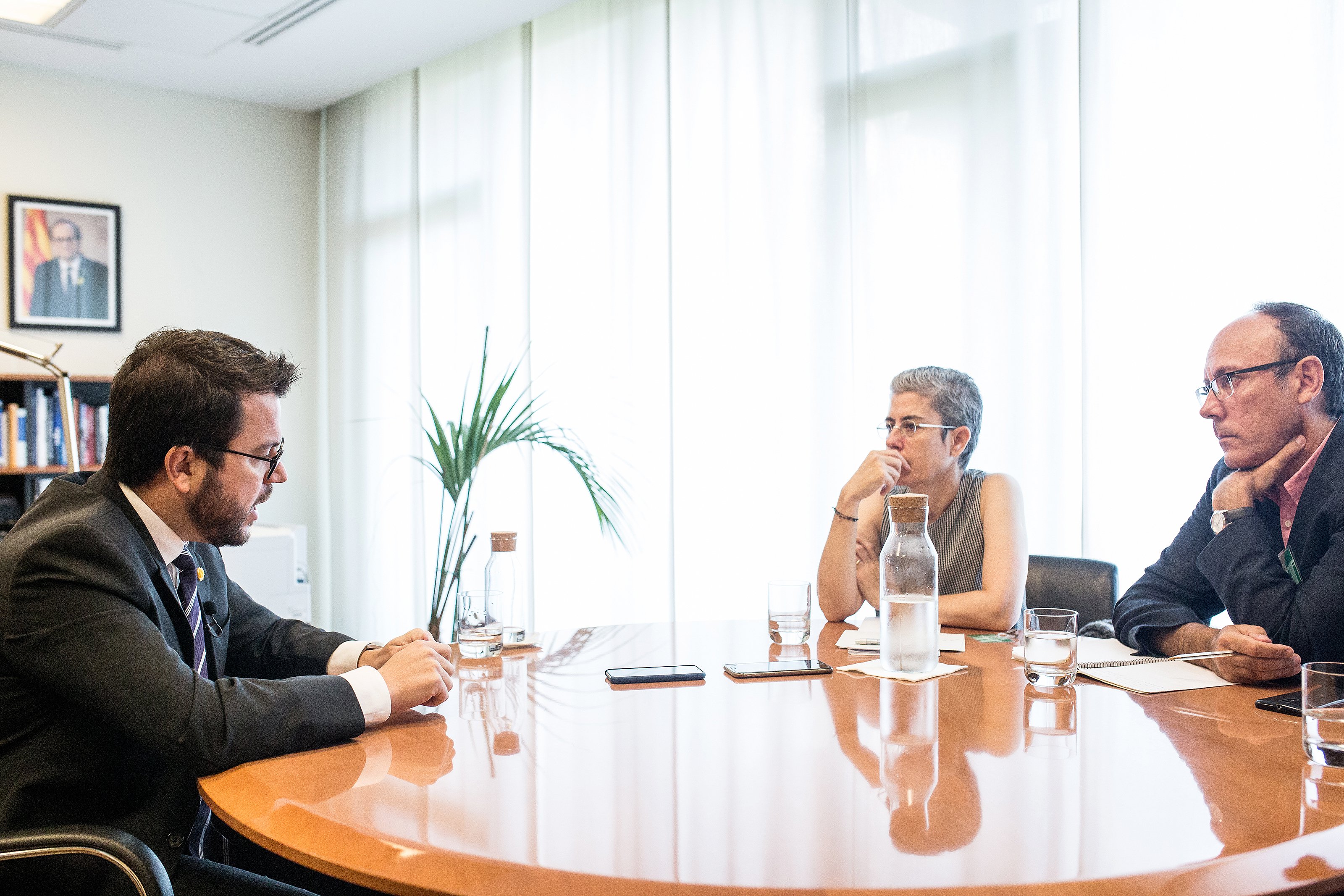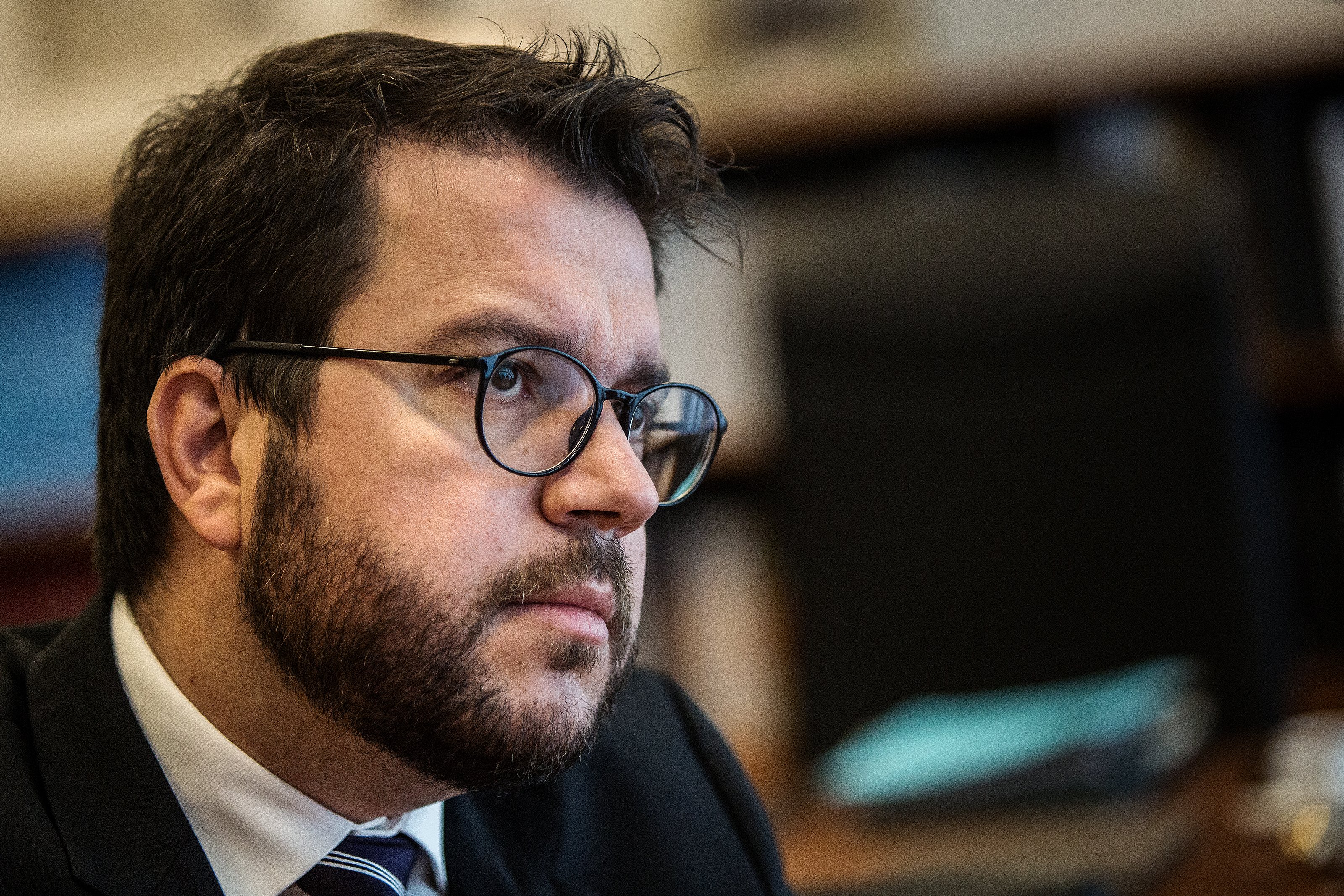You could say that this is where it all began. At the headquarters of the Catalan government's department of the economy and the vice-presidency, now headed by Pere Aragonès (Barcelona, 1982). Ground-zero for the repression against the 1st October referendum. The office of the Catalan government's number two is practically the same as it was on 20th September last year, when the Civil Guard's raids in search of evidence of the organization of the self-determination referendum led to a day-long mass rally that blocked the central Barcelona intersection of Rambla de Catalunya and Gran Via. A year later, on the office shelves there are almost the same books. On the walls, the same pictures. But the vice president is no longer Oriol Junqueras, who is imprisoned in Lledoners jail. The portrait of the president has also changed. Where there was a photo of Carles Puigdemont, in exile for the last 10 months, there is now an image of Quim Torra. A small statuette of an archer with his bow tensed is still there, with his arrow at the ready as it remained while Civil Guard officers conducted their search of the office. Among the few changes in the office, one that stands out is a portrait of Junqueras with Aragonès, conversing in their seats in the Catalan parliamentary chamber.
Exactly a year ago, the Catalan government's "laws of disconnection" were passed. In the end, things have not gone as hoped: Oriol Junqueras is in prison and you are now Catalan vice president...
What we have seen this year is that the Spanish state, faced with a process of self-determination, decided to respond in a way totally contrary to how advanced democracies do it, with ballot boxes. In our case it wasn't like this, in our case they attempted to respond with the use of force. In the face of a state that is willing to rely on force, to use the monopoly of violence that the law grants to the state, against a democratic option, we have to respond by building up much more democratic force than what we have.
In the Pedro Sánchez government there are still ministers who seem to act as if they were under Mariano Rajoy
In fact, one of the news stories of this week has been that Spain's interior ministry has sent 600 more police officers to Catalonia for the Diada...
In many aspects, in the Pedro Sánchez government there are still ministers who seems to act as if they were ministers under Mariano Rajoy. We see this in some aspects in the Foreign Affairs area and in the policing decisions. I believe that Pedro Sánchez is very conscious that he has to start changing course, and that if he doesn't, he will be responsible for the degeneration of Catalonia's political situation into something much more tense politically. Therefore, our offer of negotiation is an offer that we will maintain, even if there are these provocations, although I believe that this news has been blown up a little. We have to maintain our calm and our commitment to negotiation and mobilization, which is a serene commitment which we have to keep on with even if there is news like this which could make us think that the other side doesn't share our commitment. The only way to win is to stay firmly on our course.
If Carles Puigdemont had called elections on October 27th, would we be in another phase now?
I wouldn't dare predict what would have happened if elections had been called by the Catalan government. No-one knows for sure, and, in any case, that same day, Popular Party leaders said that even with this possibility, article 155 would still be applied. What we can say is that if the Spanish state had approached the situation with a democratic attitude, one of dialogue and negotiation, we would be in a better situation today.
At that moment, your party, the Catalan Republican Left (ERC) opposed the calling of elections to the Catalan Parliament. Would they do the same today?
Trying to wind back the clock, without taking into account the context and the circumstances, doesn't help much in my opinion. In any case, what has happened, has happened. Now, there is an opportunity to continue in the line of mobilization and negotiation. Those are the things we have to have in each hand, as a political strategy. That is what the president himself said in his speech last Tuesday. He said that, in the name of the entire government. This is what we have to pursue. Trying to turn back the clock and seeing what would have happened if different decisions had been taken, nobody can say that today things would be different. At least, regarding the decisions on the Catalan side, because here the determinant factor was the will of the Spanish state, and the will of the state from 20th September onward was that this would be beaten through repression and through the application of article 155 of the constitution.
We need to apply pressure, to put all our energies into avoiding guilty verdicts
What does president Torra mean when he says that you will not accept a guilty verdict in the referendum case?
Obviously, we cannot agree politically with a verdict that condemns our political colleagues, our political and social leaders, for having carried out the referendum. The referendum was not a crime. The calling of referendums without an agreement with the state ceased to be a crime due to the modification of the Spanish Criminal Code under [former PM] José Luís Rodríguez Zapatero. Rather than focus on what could happen after a guilty verdict, we shouldn't take it for granted or underestimate the cost that it would have for the state. For that reason we need to apply pressure, to put all our energies into ensuring that such a verdict does not happen. That is why president Torra has proposed a march for civil rights, which is a transversal mobilization, of the whole country, which must make it very clear that this country will not accept a guilty verdict. The possible responses could be very diverse. What remains very clear is that if we don't want to worsen the situation, then working together to redirect a situation of confrontation with the state into a situation of negotiation and respect for the democratic will of Catalans, then obviously, it is necessary for the Spanish state to change its position with regard to the trial.
Everyone says that the ruling on the Statute was a massive error, so let's not have a second court decision which people will also say was an error!
How does this change of attitude of the state have to be fleshed out? What has to happen? On this point, there has not been any change since Pedro Sánchez became president.
There has not been any change and for that reason we have to be mobilized as well as having the will to negotiate. And, obviously, it requires the Public Prosecutor to modify its position. And it has many opportunities to do so. The longer it takes, the more difficult it will be for this change to occur. The state is also represented through its legal advocates; therefore, there is a double presence on the part of the state in this legal process as a whole. The state's legal advocates can also modify their position. It doesn't make much sense for the Sánchez government to call for support so as to maintain stability when at the same time it backs the process under which the maximum leaders of the parties needed to guarantee this stability get sent to prison for I don't know how many years because they are a bunch of seditious rebels! Here, there is a problem of coherence and it is not our problem, it belongs to Pedro Sánchez. We will not stop pressuring, insisting on the need for the state to modify its position, to take a position of responsibility. Now, everybody says that the ruling on Catalonia's Statute of Autonomy [in 2010] was a massive error, so let's not have a second court ruling which in a few years' time people are bound to say was an error! We have to avoid it before it happens, because if not, it would mean making the situation of repression chronic, which cannot do anything but worsen the political situation.
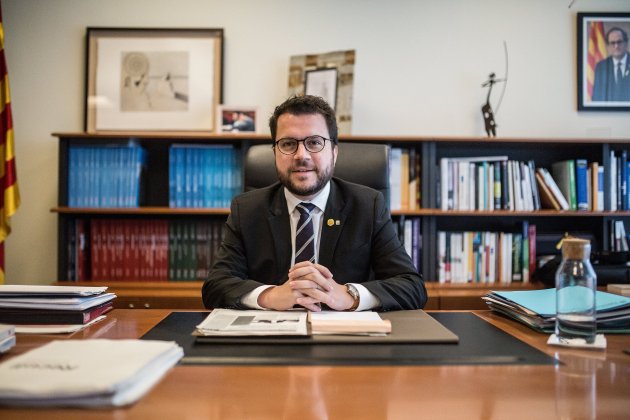
And how does the Spanish government respond when you bring this up?
On the one hand, they are conscious that maintaining this situation is negative, but we have not seen any changes yet. The separation of state powers has been wiped out in the case of the process against the pro-independence leaders. There has been clear connivance, at least, by Mariano Rajoy's PP government with the Public Prosecutor and with the judicial powers. The Spanish government has to be brave, it has to break with the PP's repressive line and it has to modify its position.
Sánchez knows that they have to make a move, out of a sense of state, and they have to find the courage to do that
Pedro Sánchez can argue that he has a precarious parliamentary situation in the face of the strong stand taken by the Popular Party and Ciudadanos against the independence movement.
This is not the Catalan government's problem. What we won't do is to stop reclaiming the freedom of the political prisoners and the return of those in exile just so that the PP and Cs do not wear down Pedro Sánchez. It isn't our problem. Our problem is that we have our colleagues imprisoned - and not because they have carried out some hidden crime. No. They have been imprisoned because there is a general case open against a political position that more than two million people in Catalonia support. And they lock up the leaders because they can't lock up the two million. It is not our problem. Pedro Sánchez will defend himself. What we ask is that he moves his position. And I am convinced that his government knows that they have to move, out of a sense of state, and they have to find the courage to do so.
Episodes such as the defence that the Spanish state is conducting for judge Pablo Llarena in Belgium demonstrate the reticence to correct their positioning. Are you very confident that this can change?
It is not a question of having confidence in the good faith of the Spanish government or not. It is that we have to have confidence in our strength and determination, and our determination is that we will do everything in our power so that this position changes.
Regarding the strength of the pro-independence forces in the Spanish congress, do you believe that the Sánchez government really has a problem, for example, in passing the annual budget?
It could do. Obviously, for any government, for the Catalan government as well, a failure to get approval for its budgets is a problem. How serious will this problem be? It will depend on the context, obviously.
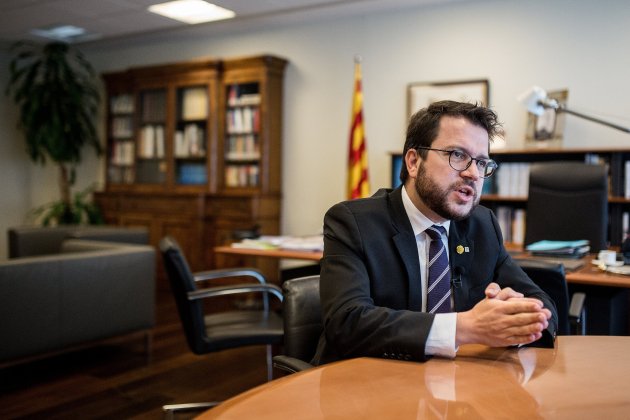
So, then, how much strength do the Catalan independence parties really have in Madrid?
What Sánchez has to be very clear about is that he can't go out into the world explaining that there is a dialogue open with Catalonia, as he did on Wednesday in Sweden, and at the same time, support the imprisonments. Dialogue is incompatible with prison. They know, and the institutional power of the state knows, that either there is a negotiation, a political solution in this conflict we have, that also includes an end to the repression, or it will only lead to the hardening of the problem. We appeal to their responsibility. It is not that we have confidence in their good faith. We demand them to be courageous. We will always, as Torra has said, offer our open hand and a readiness to negotiate. More than that: we ask for this negotiation to start now. If there is a guilty verdict and the Spanish government has maintained a position of alignment during the trial so that this happens, the responsbility will be theirs, not ours. And I compare it with the ruling against the Statute, a constitutional conflict that did not even entail anybody going to prison and therefore, by comparison, the personal suffering and the things we feel now, not only friends and partners of those accused, but also Catalan people broadly, is something very different. If an error was made before, then they shouldn't make the same error again. Because it will only lead to a situation of conflict which we won't be able to find a way out from. There has to be change, the train has to be switched to a new track, there has to be a negotiating table. And we know that this doesn't happen overnight, but rather, there is a prior requisite for it to happen. That is: to have a two-way negotiation, what you can't do is to negotiate under the threat of continuing the preventive detention.
Sánchez cannot go out into the world explaining that there is a dialogue open with Catalonia and at the same time support the imprisonments: dialogue is incompatible with prison
Also, the threat of reapplying article 155, directly taking over the Catalan government, is still on the table. Why should Sánchez change this if it works for him as a strategy?
Article 155 was designed to be applied for only a few months. It is impossible to sustain an administrative and political occupation of Catalonia. Because of that, they made an immediate call for elections with the expectation that the independence movement would be defeated. And it didn't work out - we won. They know perfectly well that a new 155 would be a very great error. The instrument is not imposition, it is negotiation. We have to take it, because if we don't do so, the situation won't improve. It is in everyone's interest to improve the situation, for the stability of Spain and its image abroad, it is in everyone's interest.
On the Catalan side, what do you have to do to assist this?
We have already started to do it, the Catalan president made a solemn proposal for negotiation with the state last Tuesday. Therefore, our outstretched hand is there and we will carry on in this line. And we will take this approach on all fronts. And we will not just do it for a day, but we will persist because we understand that it is the only way out, and we will support it with the necessary mobilization because we are convinced that a large majority of Catalans want this, and not only pro-independence people.
We do not renounce taking a unilateral route but in the state's use of force, it will beat us because we want to achieve independence via peaceful means
What about the unilateral route? Torra says that you have not renounced anything.
Because indeed, we haven't renounced anything. Now, we have always said, and especially over the last few months, you have the instruments that you have and the force that you have. The state has conducted itself for this conflict to be resolved through the use of force, and the use of force, when they have the monopoly on the use of violence, is not a field of play on which the Catalan cause can win: we will win on the fields of democratic force, civic mobilization, pacifism... And to win on this field we need broad consensus. President Torra quoted three instances: 80% of the Catalan population believes that the political conflict has to be solved with a referendum, 80% is opposed to the state repression, and 80%, when asked whether they want 'monarchy or republic', choose a republic. If we situate ourselves on the field of democracy, of civic and peaceful mobilization, these consensuses have to allow us to be able to win. In the field of the use of force, the state will beat us, because we have said that we want to achieve independence via peaceful means. The state wants to maintain the unity of Spain even using the violence and on 1st October last year we saw that. Therefore, we have to change our field of play.
We will work to have international observers at the trial, the state will not just have a free ride
But these 3 points of consensus which you say there are in Catalonia do not apply to the Spanish state. What motivation can the state have to respond to the consensus in Catalonia when what gives it a political result is satisfying the consensus that applies to Spain?
They must be conscious that maintaining this situation of conflict can only aggravate it, bring more instability and affect Spain's international image still more. When there is a trial - and we are working to have international observers present and scrutiny of the trial from abroad, this will not be a free ride for the state. When there is a trial in Turkey against dissidence, European public opinion doesn't get to know the names of the judges, but we do get to know the name of Erdogan. Therefore, they know that the overall image of the state is what is damaged. We repeat: they have to move towards the route of negotiation, not imposition.
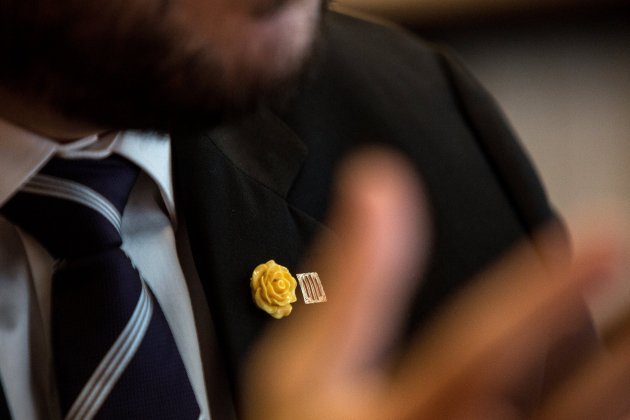
Those in exile would not have so much force if there were not also members of the Catalan government in prison
The fact that part of the Catalan government and Puigdemont himself are in exile, how is this helping this internationalization? I ask you because there have been voices from ERC critical of the way this has been handled.
Those in exile would not have as much force, they would not have the capacity to defend themselves as they have done, if there were not a part of the Catalan government in prison. If there were not members of the government in prison, when extraditions were brought up in other jurisdictions it would not be so clear that the Spanish state was violating rights and freedoms. Therefore, they are two faces of the same coin, the government in exile and the government in prison. The government in exile enables the internationalization of our cause, so that the dots can be joined from judge Pablo Llarena's conduct of the case to the interpretations by other legal jurisdictions. And when the dots are joined, it does not look good. And the government in prison can obviously see how it can benefit from the defence actions that are being carried out in exile and at the same time it gives those in exile a justification for their status. If there were not people imprisoned and persecuted, why would you have to leave the country?
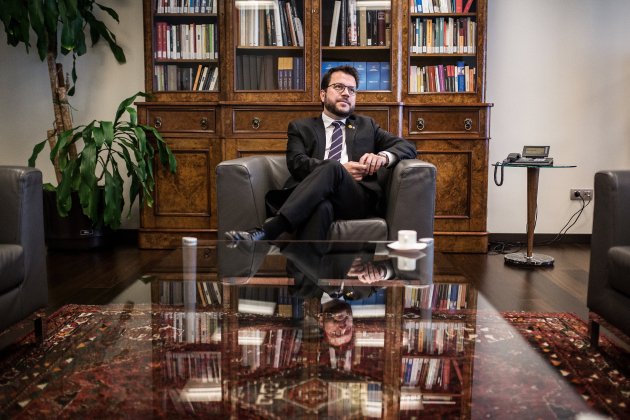
This week there has been an offer from Sánchez for a referendum on a new Catalan Statute of Autonomy. Would you be willing to negotiate this, to go back to 2006?
We cannot go back to 2006. Many things have happened since then. We have seen how the Statute was cut down by the Spanish parliament, but in spite of everything it was approved by the Catalan people in a referendum. And then it was cut back further by the Constitutional Court. There is no guarantee that if anybody wanted to make a new Statute the same thing would not happen. Apart from the fact that what is now debated in Catalonia is not a new Statute, it is independence, and this option has to be in the solution. So it is good that there are proposals on the table from the point of view of theoretical discussion, of in-depth political discussion. But our response is to respect the exercising of the right to self-determination.
There is no guarantee that if anybody wanted to make a new Statute, the Constitutional Court would not cut it back again
As a result, will there be no negotiation about a new Statute with Sánchez?
It is fairly unlikely to happen. If they say to us that support for independence does not have 50% of votes, what support is there for the proposal of a new Statute? A far smaller figure. Therefore, it is a proposal that has nowhere to go. That there is a will to make proposals is good. But this is not the solution.
What do you put it down to, then, that a proposal like this is made?
That every Spanish leader knows that they cannot maintain a situation of control, or of application of the Spanish constitution in Catalonia, with a population that is against it. In spite of all the repression that they can apply, in spite of the use of force that can make, the state cannot maintain its legitimacy in Catalonia without a certain consent from the population. In the end, democracy has much greater force than what the Spanish state might sometimes want to apply. Rajoy applied article 155 and then called elections because he could not maintain a situation of conflict between repression and democracy in Catalonia. And Sánchez, with the new Statute, in the end knows that he has to put a proposal on the table; they know that the solution has to be guaranteed democratically by the people of Catalonia. We sustain that this guarantee must be a referendum of self-determination.
